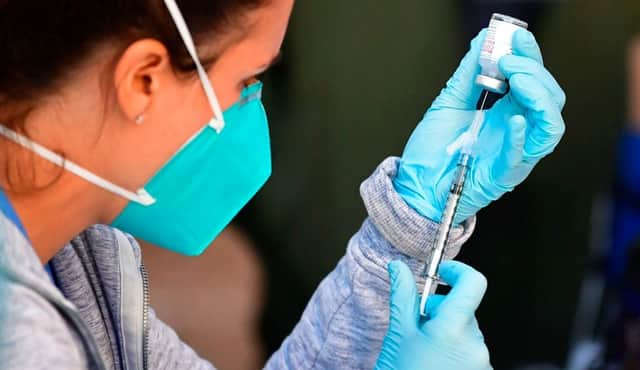New California Covid strain discovered spreads more easily - and is partially resistant to existing vaccines


A new strain of Covid-19 has emerged in California which spreads more easily and is at least partially resistant to existing coronavirus vaccines, scientists have warned.
Researchers at UC San Francisco have said the mutation should be marked as a “variant of concern”, much like the UK strain, due to its ability to evade the antibodies generated by vaccines or previous Covid-19 infection.
24% more transmissible
Advertisement
Hide AdAdvertisement
Hide AdCalifornia has seen a significant increase in Covid-19 cases and deaths in research weeks which is now being attributed in part to the new strain.
It is expected that the California variant could account for as many as 90 per cent of the US state’s infections by March, according to The LA Times.
Before the discovery of the new variants, much of the concern about the rising case numbers had been directed towards the arrival of the B.1.1.7 strain from the UK.
Studies found that the Californian strain, named B.1.427/B.1.429, likely first emerged in May last year but has now become much more dominant.
Advertisement
Hide AdWhile analysis of the new variant is currently under review by the public health departments of San Francisco County and the state, which collaborated in the research, findings have not yet confirmed that the strain was the principal driver of California’s increase in infections and deaths.
Advertisement
Hide AdIn some areas, Covid-19 case rates had already begun to rise before the variant had been detected, while in other parts, both the variant and new infections rose simultaneously.
Researchers are still investigating how much more infectious the strain is, but samples collected from a range of countries suggest it is between 19 and 24 per cent more transmissible than other variants.
In some cases this figure was much higher, with the strain found to spread at a rate that was six times higher than any other variants during an outbreak in a nursing home.
Advertisement
Hide AdThe ability of the Californian strain to spread more quickly was also evident in laboratory results, with analysis from viral samples around the state showing that those who were infected with this variant had a viral load that was twice as high.
Much like the UK coronavirus variant, the Californian strain is also armed with ‘enhanced capabilities’ and scientists fear that if the two circulate in the same population, it raises the likelihood of a spike in infections and deaths.
Advertisement
Hide AdIt is also feared that the two strains could infect a single person and mutate again, creating an even more dangerous variant of Covid-19.
Partially resistant to vaccines
Experts have also warned that the Californian strain spreads more readily than other variants and can, at least partially, evade antibodies that are produced from prior infection or Covid-19 vaccines.
Advertisement
Hide AdLab studies revealed that it is four times less susceptible than the original coronavirus strain to neutralising antibodies from the blood of Covid-19 patients.
It was also twice as likely to not be susceptible to antibodies in the blood of people who have been vaccinated with either the Pfizer or Moderna coronavirus vaccines.
Researchers said the diminished potency is “moderate but significant”, and added that the variant is associated with severe illness and death.
Advertisement
Hide AdThe strain was found to cut the effectiveness of neutralising antibodies from previous infection, or from a Covid-19 vaccine, in half.
Advertisement
Hide AdBy comparison, when these antibodies encountered the coronavirus strain that is currently dominant in South Africa, their effectiveness was only reduced to one-sixth of their usual levels.
The findings come following the discovery of another mutant strain in Finland that is going undetected by tests, which could be accelerating the spread of the disease.
Researchers have not yet confirmed if the new strain, dubbed Fin-796H, is more easily transmitted, or if it would affect immunity.